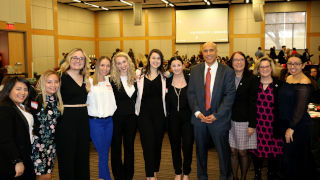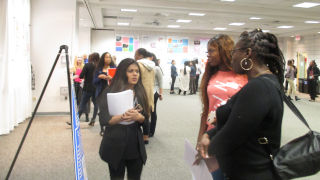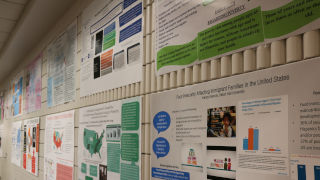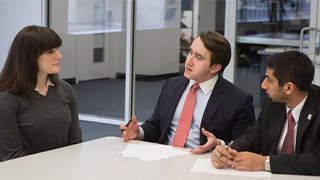Student Research Featured at Statewide Social Work Policy Symposium
Tuesday, February 26, 2019

Cary Booker (4th from R) with Dawn Apgar, B.S.W. Program Director (3rd from R), Mary Ladriau, B.S.W. Field Director (2nd from R), and some of the SHU student presenters
Seton Hall students who are graduating with Bachelor of Arts degrees in Social Work (B.S.W.) this Spring participated in the Annual Paul Shane Social Welfare Policy Symposium sponsored by the New Jersey Baccalaureate Social Work Education Association. The event was held at Rutgers University – Newark campus on February 22nd. Central to this event was the opportunity for students to present their senior capstone research on public policies impacting those living in poverty. Topics included, but were not limited to, student homelessness, healthcare, immigration, environmental racisim, food insecurity, education, the poverty to prison pipeline, and the financial costs of caregiving. Half of all New Jersey B.S.W. students statewide selected to present their work at this event were Seton Hall seniors.

B.S.W. students present their work to more than 300 attendees
The event had more than 300 attendees who were committed to the theme, "Who are the Poor: Implications for Social Welfare/Work" with the keynote presenter, Cary Booker - a Senior Policy Advisor to New Jersey Governor Phil Murphy, focusing on the development of educational systems that support successful growth and development from birth to adulthood. Two Seton Hall students identified poverty as an educational issue and highlighted the need for national educational reform, supporting the Governor's current vision to expand free public education in New Jersey. All of the Seton Hall B.S.W. student work received high praises by both educators and students statewide.

Some of the 27 B.S.W. student posters that were featured at the Symposium
Central to the mission of social work is addressing the underlying societal problems that keep groups marginalized and oppressed. Social workers speak out against social injustice such as racism, sexism, poverty and inequalities of all kinds. Advocacy is at the heart of the profession. The research done by the social work students is critical as it aimed to highlight problems facing those struggling financially and to develop innovative recommendations for addressing important societal problems. This research, required for graduation, represents dedication and hard work inside and outside the classroom as B.S.W. students begin the important transition from learners to social work professionals acting as change agents in the field.




